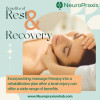There are a few injuries that can impact a person’s quite like a traumatic brain injury or a spinal cord injury. A traumatic brain injury can affect a persons’ memory, sleep, personality, mood, responses, planning, understanding and so on, while a spinal cord injury can affect their independence, mobility and functions.
These changes can affect one person’s mental health and lead to isolation, depression, anxiety and loneliness, which can also affect their relationships with others as well.
Loneliness is something that anyone can experience, although it is more likely in those with a traumatic brain or spinal cord injury.
Around the world, it is estimated that roughly 33 percent of adults experience feelings of loneliness, and 36 percent of all Americans feel serious loneliness. For many, this feeling of disconnection and isolation is just a fact of life. But for those living with a brain injury or spinal cord injury, feelings of loneliness can be especially severe – and often left unaddressed.
After a spinal cord injury, those aged 31-45 had the highest propensity for loneliness, as well as those with higher lesion levels and less functional independence, and it is estimated that 55 percent of those with a spinal cord injury reported being lonely; even those with long term partners and those who do not live alone.
Of those suffering from a traumatic brain injury, 70 percent have seen a deterioration in their social life, with a similar percentage feeling that people in their lives do not understand the effects of their condition.
According to a Mayo Clinic study and research from Michigan Medicine, insurance claims data for adults, both with traumatic spinal cord injury and those without the condition, enrolled in a health insurance plan for at least three consecutive years and their diagnosis of a mental health disorder were examined. In particular, they found adults with spinal cord injury had a higher incidence of anxiety disorders (19.3% vs 14.1%), depressive disorders (29.3% vs 9.3%), and psychological multimorbidity, or having more than two mental health conditions (37.4% vs 23.9%), as compared to adults without spinal cord injury.
Those coping with physical impairments are particularly vulnerable to experiencing loneliness because of discrimination and social exclusion, or because of environmental barriers and functional limitations, which hinder social participation.
A brain injury affects a person in many different ways and can significantly alter their personality. It can be challenging to communicate, express feelings and even connect with family in friends the same way they are used to. This can leave a brain injured person with feelings of irritability, and disconnect, which can lead to isolation.
Not only are they faced with personality challenges, but their independence, mobility and the way they normally function can be affected as well.
Those suffering from a spinal cord injury face loss of function, mobility and independence. This can affect a person in several ways. Those with a spinal cord injury have to re-learn or adapt to a new way of life, which can lead to feelings of loneliness or isolation.
According to Flint Rehab, those who suffer from a spinal cord injury face many psychological changes. These include:
- Chronic pain. Pain can negatively affect your mood and make it difficult to move or focus.
- Impaired mobility. Paralysis/weakness may make it more difficult for you to participate in your favorite activities, at least initially.
- Lack of independence. Having to rely on others more frequently because you cannot use the bathroom or eat on your own, for example, can take a toll on your mental health.
- Medications. Many people will be prescribed strong painkillers after spinal cord injury that can affect the way the brain functions. Similarly, they can become addictive, so they are not ideal for long-term use.
- Poor diet. What foods you eat, and the frequency of your meals can affect your energy levels, performance, and mood.
- Substance use. High-stress situations can lead a lot of people to turn to alcohol or other substances for comfort. While they might provide temporary relief, substances can impair judgment and cause emotional instability.
- Physical inactivity. Physical inactivity will lead to poor circulation, reduced metabolic rate, and increased risk of injury.
- Poor sleep quality. Secondary effects of a spinal cord injury such as chronic pain and respiratory complications can disrupt sleep. Lack of sleep is associated with low energy levels, increased irritability, and reduced alertness.
- Financial problems. Some individuals with a spinal cord injury may have trouble getting their insurance to cover their treatments or may be unable to return to their jobs due to their motor impairments.
- Traumatic brain injury. If a severe event causes a traumatic brain injury along with your spinal cord injury, individuals may experience cognitive impairments that affect personality and behavior.
- Isolation. Feeling lonely and misunderstood can trigger negative thinking.
The Impact of Loneliness
After facing something as serious as a traumatic brain injury or spinal cord injury, many people face loneliness and isolation.
Loneliness is marked by feelings of isolation despite wanting social connections. It is often perceived as an involuntary separation, rejection or abandonment by other people.
According to the Centers for Disease Control, loneliness is attributed to various health risks.
- Social isolation significantly increased a person’s risk of premature death from all causes, a risk that may rival those of smoking, obesity and physical inactivity.
- Social isolation was associated with about a 50 percent increased risk of dementia.
- Poor social relationships (characterized by social isolation or loneliness) was associated with a 29 percent increased risk of heart disease and a 32 percent increased risk of stroke.
- Loneliness was associated with higher rates of depression, anxiety and suicide.
- Loneliness among heart failure patients was associated with a nearly four times increased risk of death, 68 percent increased risk of hospitalization, and 57 percent increased risk of emergency department visits.
Loneliness can also double the risk of Alzheimer’s, affect sleep quality, cause stress hormones to rise, contribute to obesity and lead to thoughts of suicide.
How to Overcome Loneliness
Overcoming loneliness can be a difficult challenge, especially for those suffering from a brain injury or spinal cord injury, but it is far from impossible. It takes effort, dedication, and resilience. One effective way to take action is to reach out to friends and family, build strong relationships with them, and express yourself in healthy ways.
Additionally, do not be afraid to seek help from mental health services if needed.
Other important ways to reduce loneliness include engaging in enjoyable activities, joining a support group, making social connections and new relationships, and setting a social goal for yourself (ex: saying I will socialize with 4 people this week), learning a new skill, sticking to a scheduled routine, staying physically active, focusing on the small victories, and to be more accepting of yourself.
Neuropraxis has various resources to help those overcome the challenges of a brain injury or spinal cord injury.
Not only does Neuropraxis offer physical, occupational, speech and recreational therapy, as well as case management and life skills navigation, but Neuropraxis also offers additional resources such as caregiver support videos and modules to help caregivers adapt to the “new” life their loved ones are living after a brain injury or spinal cord injury.
For more information, visit www.neuropraxisrehab.com, or contact Neuropraxis at (888) 266-8921 or hello@neuropraxisrehab.com.
Resources:
- statista.com/statistics/1222815/loneliness-among-adults-by-country/
- headway.org.uk/about-brain-injury/individuals/brain-injury-and-me/the-debilitating-impact-of-social-isolation/#:~:text=Headway%27s%20own%20research%20shows%20that,numerous%20reasons%20why%20isolation%20occurs.
- biat.org.au/understanding-abi/common-effects-of-brain-injury#:~:text=People%20with%20brain%20injury%20often%20experience%20difficulties%20with,the%20way%20a%20person%20thinks%2C%20feels%20and%20behaves.
- verywellmind.com/loneliness-causes-effects-and-treatments-2795749#:~:text=Loneliness%20has%20a%20wide%20range%20of%20negative%20effects,and%20suicide%208%20Increased%20stress%20levels%20More%20items
- cdc.gov/aging/publications/features/lonely-older-adults.html
- sciencedirect.com/science/article/pii/S0003999321014271
- labblog.uofmhealth.org/lab-notes/spinal-cord-injury-increases-risk-for-mental-health-disorders
- healthgrades.com/right-care/mental-health-and-behavior/7-health-effects-of-loneliness
- renschandrensch.com
- constanttherapyhealth.com/brainwire/5-tips-to-feel-less-isolated-when-recovering-from-stroke-or-brain-injury-at-home/
- biausa.org



